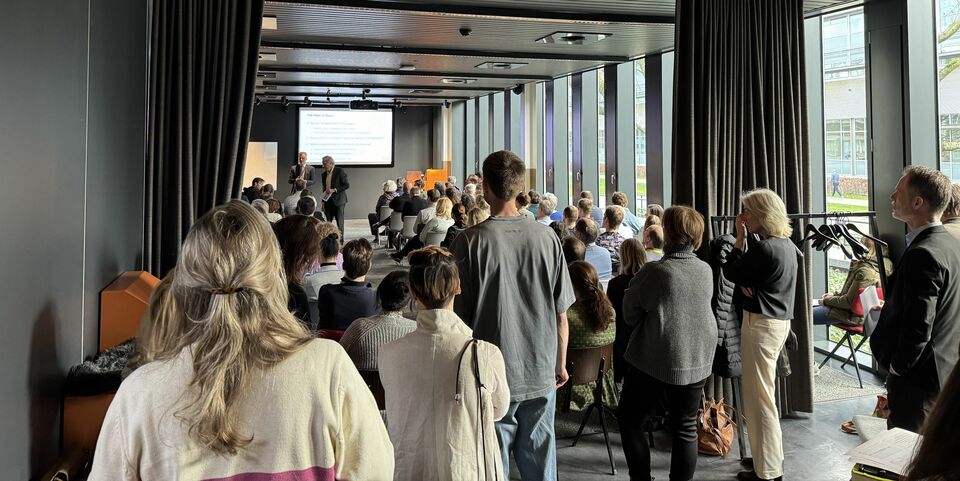An invitation to talk about governance at TU/e? Sounds boring! But in the knowledge that the future of the current departments is at stake, many staff members and a handful of students did make their way to Ceres. In a packed-out room, the working group asked the TU/e community for feedback. As there were too few seats, some people at the back of the room had to stand.
A short introduction by Robert-Jan Smits, President of the Executive Board, and Edwin van den Heuvel, Dean of the Department of Mathematics & Computer Science and chair of the governance working group, outlined the challenges TU/e is facing: the outside world is changing rapidly and the societal issues that TU/e aims to solve require a decisive organization. Isn’t TU/e too compartmentalized? For technology development in energy transition, for example, knowledge and research from various departments is needed: physics, chemistry, mechanical engineering, electrical engineering. Wouldn’t it be a good idea, therefore, to merge departments?
Artificial intelligence
“All of this is way too meta. This is not for me,” said a professor before leaving the session. Those left behind split into groups to reflect on challenges (including increased decisiveness) and possible solutions (such as the merging of the departments). Each group could record its feedback using a special microphone. The audio files were collected and will be analyzed using artificial intelligence.
In between, there was time for questions. Are separate talks with students being organized, someone asked working group chair Van den Heuvel. “Not yet,” he responded. “But we will,” he promised.
If TU/e goes from, say, nine to three departments, doesn’t that pose the risk that the university will transform from an organization with many low partitions to one with fewer but very high partitions, someone wondered. “We have to do a good job mapping out the disadvantages of possible solutions,” Van den Heuvel responded. He also repeatedly emphasized that all options are on the table for the moment: “No choices have been made yet.””
Joint direction
Someone else asked whether the working group is considering increasing the number of departments. “No,” replied van den Heuvel. “This would make the organization more complex. In meetings we sometimes already see that it’s difficult to find a joint direction.”
The current departments are very autonomous and all have their own work processes. This can make things difficult for support services, as they must approach every department in a different way. “To what extent do we want to standardize things?” Van den Heuvel asked his audience. “We are inclined to say that a lot of things should be done the same by everyone, as this would allow services to do their job better.” But, he added, if TU/e switched to three departments, it would be feasible for the services to make separate working arrangements with each of them.
At the end of the gathering, the room was asked who was open to decreasing the number of departments. Quite some hands were raised, but it wasn’t clear if they represented a majority. Perhaps the analysis of the submitted audio files will shed light on this. To be continued.


Discussion